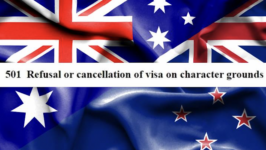Court Decision Forces Government to Release Detainees Slated for Deportation

In the days leading up to Christmas and on to New Year, Australian authorities released 100-odd immigration detainees awaiting deportation, as a result of their having fallen foul of the character test set out in section 501 of the Migration Act 1958 (Cth).
Abbott government amendments made to the Act in late 2014 have resulted in the deportation of thousands of noncitizens, often long-term residents and mainly those born in New Zealand, as the bar was lowered so that automatic deportation occurs after a prison sentence of at least 12 months.
And while there has been no official government announcement as to why the mass release of those slated for deportation occurred, Refugee Action Coalition spokesperson. Ian Rintoul told SBS last week, that he understands a decision made by the Federal Court resulted in these actions.
According to the long-term refugee advocate, the court found there is no provision in the Act for mandatory deportation based of an aggregate sentence, which involves multiple sentences relating to different offences being imposed together as one single term of imprisonment.
The ruling on section 501
Delivered on 22 December, the ruling in Pearson versus the Minister for Home Affairs related to New Zealand born Kate Pearson, who had her visa cancelled in July 2019, after she was sentenced to an aggregate maximum term of 4 years and 3 months prison in regard to ten offences.
Section 501(3A) of the Act requires that the minister must cancel the visa of a noncitizen if they’ve been sentenced to death, life imprisonment or for a “term of imprisonment of 12 months or more”.
However, there is no mention of an automatic cancellation in regard to an aggregate sentence, and in terms of cancelling a visa over “2 or more terms of imprisonment, where the total of those terms is 12 months or more”, under subsection 501(7)(e), it remains up to the discretion of the minister.
The challenge put to the court by Pearson’s legal team involved whether “an aggregate sentence of imprisonment… is a single sentence to a term of imprisonment or a sentence to ‘2 or more’ terms of imprisonment or is neither.”
The Federal Court cited section 53A of the Crimes (Sentencing Procedure) Act 1999 (NSW), which establishes that a court can impose an aggregate sentence for two or more offences, and in doing so, it must provide individual indicative sentences that would have applied to each separate offence.
The three-justice bench then outlined that the authorities maintain that the individual indicative sentences hold “no practical operation”, and therefore, the aggregate sentence fails to convey the seriousness of each of the crimes captured under it.
“Ms Pearson was not sentenced (for an offence) to a term of imprisonment of 12 months or more,” found Federal Court Justices James Allsop, Daryll Rangiah and Sarah Dennington. “Consequently, her visa was not amenable to mandatory cancellation under s 501(3A).”
“Of course, nothing would have prevented the Minister from exercising his discretion pursuant to s 501(2) or (3) to cancel her visa should he have been satisfied of the matters in that subsection,” their Honours added.
Implications sought
On finding the appeal was successful, the Federal Court did not make an order as to whether Pearson should be released. And the decision still permits the minister to use their discretionary powers to cancel a noncitizen’s visa under such circumstances.
Following the Federal Court finding, Home Affairs has been scrambling to understand the full implications of it, while it appears the department has determined to release those in immigration detention at present whose visas have been cancelled as a result of an aggregate sentence.
And it’s yet to be seen whether the decision will have any bearing on those who have already been deported on the basis of an aggregate sentence since the Scott Morrison-drafted laws took effect close to a decade ago.







